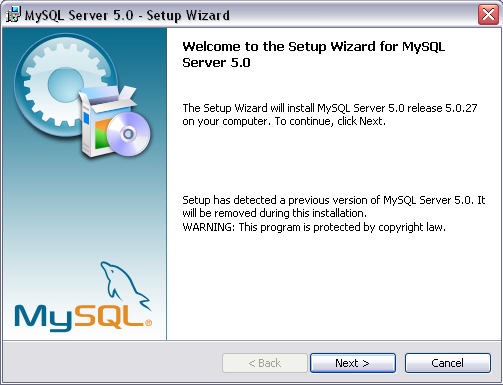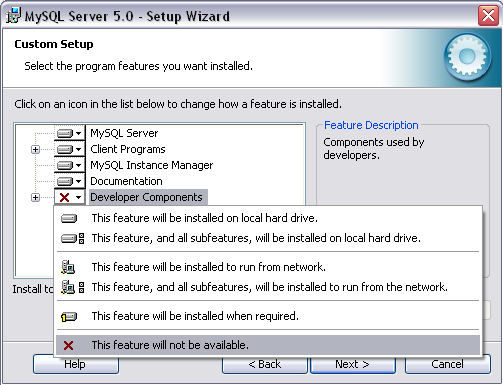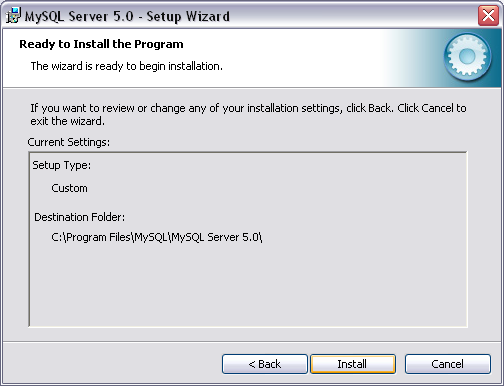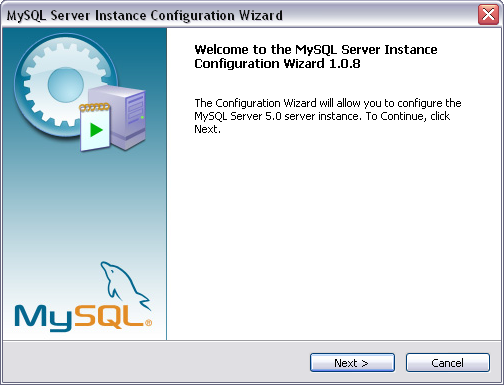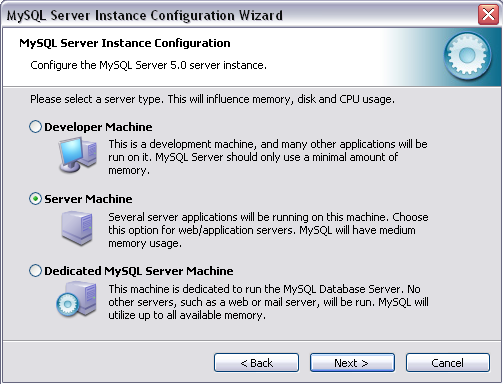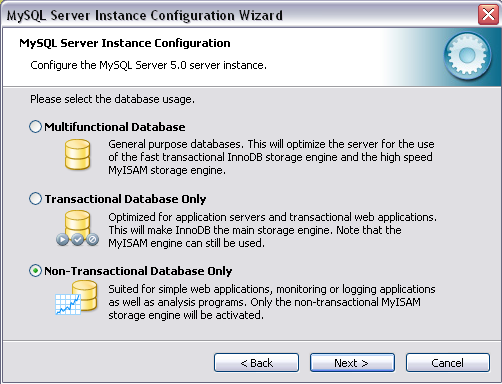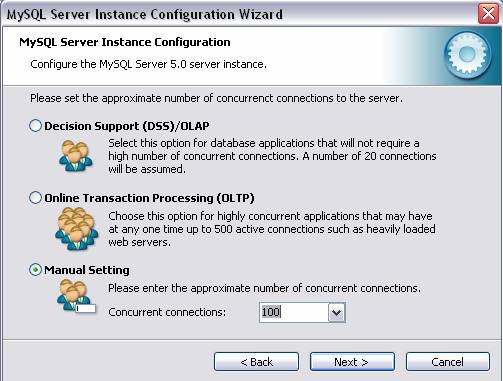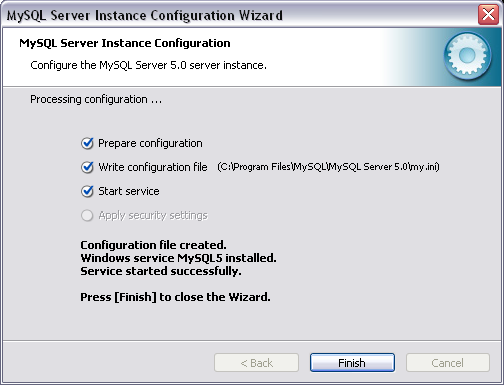MySQL database installation guide: Difference between revisions
More actions
No edit summary |
No edit summary |
||
| Line 1: | Line 1: | ||
{{HelpFiles_Deployment}} | {{HelpFiles_Deployment}} | ||
==MySQL database installation guide== | == MySQL database installation guide == | ||
===MySql distribution to install=== | === MySql distribution to install === | ||
Version 5.0 | Version 5.0 | ||
==How to get MySql== | == How to get MySql == | ||
http://dev.mysql.com/downloads/mysql/5.0.html | http://dev.mysql.com/downloads/mysql/5.0.html | ||
==Installing MySql on Windows== | == Installing MySql on Windows == | ||
Installation Package : indows (x86) ZIP/Setup.exe | Installation Package : indows (x86) ZIP/Setup.exe | ||
Install MySql with the Automated Installer : Unzip the package, and run setup.exe file | Install MySql with the Automated Installer : Unzip the package, and run setup.exe file | ||
Installation Steps : After double clicking the setup file, the Setup Wizard is started. Click Next button to start on Step 1. | Installation Steps : After double clicking the setup file, the Setup Wizard is started. Click Next button to start on Step 1. | ||
[[Image:2780.png]] | [[Image:2780.png]] | ||
Step 1 - Choose the setup type | Step 1 - Choose the setup type | ||
Click Custom radio button in order to select the needed features to install. Click Next button to go to step 2. | Click Custom radio button in order to select the needed features to install. Click Next button to go to step 2. | ||
[[Image:2782.png]] | [[Image:2782.png]] | ||
Step 2 - Custom Setup | Step 2 - Custom Setup | ||
Click Developer Components button and choose This feature will not be available to have developer components not to be installed. | Click Developer Components button and choose This feature will not be available to have developer components not to be installed. | ||
[[Image:2784.png]] | [[Image:2784.png]] | ||
Click Change… button to modify the location for installing MySql (if necessary). Click Next button to go to Step 3 | Click Change… button to modify the location for installing MySql (if necessary). Click Next button to go to Step 3 | ||
[[Image:2786.png]] | [[Image:2786.png]] | ||
Step 3 - Install the program | Step 3 - Install the program | ||
Read the current settings summary before starting to install. Click Install button to start installing. | Read the current settings summary before starting to install. Click Install button to start installing. | ||
[[Image:2787.png]] | [[Image:2787.png]] | ||
The installation progress is shown. | The installation progress is shown. | ||
[[Image:2788.png]] | [[Image:2788.png]] | ||
At the final step of the installation progress, you are asked to sign up to MySql.com. | At the final step of the installation progress, you are asked to sign up to MySql.com. | ||
[[Image:2789.png]] | [[Image:2789.png]] | ||
Finalizing the wizard | Finalizing the wizard | ||
Check Configure the MySql Server now checkbox to start configuration wizard or uncheck to start it later. | Check Configure the MySql Server now checkbox to start configuration wizard or uncheck to start it later. | ||
[[Image:2790.png]] | [[Image:2790.png]] | ||
==Configuration Wizard== | == Configuration Wizard == | ||
Click Next button to go to Step 1. | Click Next button to go to Step 1. | ||
[[Image:2791.png]] | [[Image:2791.png]] | ||
Step 1 - Select configuration type | Step 1 - Select configuration type | ||
Click Detailed Configuration radio button and press Next button to go to step 2. | Click Detailed Configuration radio button and press Next button to go to step 2. | ||
[[Image:2792.png]] | [[Image:2792.png]] | ||
Step 2 – Select a server type | Step 2 – Select a server type | ||
Click Server Machine radio button to have server applications to run on the current machine. Press Next button to go to Step 3. | Click Server Machine radio button to have server applications to run on the current machine. Press Next button to go to Step 3. | ||
[[Image:2793.png]] | [[Image:2793.png]] | ||
Step 3 – Select database usage | Step 3 – Select database usage | ||
Click Non – Transactional Database Only radio button to activate only the non – transaction MyISAM storage engine. Press Next button to go to Step 4. | Click Non – Transactional Database Only radio button to activate only the non – transaction MyISAM storage engine. Press Next button to go to Step 4. | ||
[[Image:2795.png]] | [[Image:2795.png]] | ||
Step 4 – Number of concurrent connections | Step 4 – Number of concurrent connections | ||
Click Manual Setting radio button and set the approximate number of concurrent connections to the server to 100. Click Next to go to Step 5. | Click Manual Setting radio button and set the approximate number of concurrent connections to the server to 100. Click Next to go to Step 5. | ||
[[Image:2796.jpg]] | [[Image:2796.jpg]] | ||
Step 5 - Enable TCP/IP Networking and Strict mode | Step 5 - Enable TCP/IP Networking and Strict mode | ||
[[Image:2797.jpg]] | [[Image:2797.jpg]] | ||
Step 6 - Set the default character set | Step 6 - Set the default character set | ||
[[Image:2798.jpg]] | [[Image:2798.jpg]] | ||
Step 7 - Set the Windows options | Step 7 - Set the Windows options | ||
Check Install As Windows Service checkbox and change the service name (if necessary). | Check Install As Windows Service checkbox and change the service name (if necessary). | ||
Check Launch the MySql Server automatically checkbox. | Check Launch the MySql Server automatically checkbox. | ||
Check Include Bin Directory in Windows PATH checkbox in order to be able to access MySql via the command line. | Check Include Bin Directory in Windows PATH checkbox in order to be able to access MySql via the command line. | ||
[[Image:2799.jpg]] | [[Image:2799.jpg]] | ||
Step 8 - Set the security options | Step 8 - Set the security options | ||
It is very important to check Enable root access from remote machines checkbox in order to make the Data Cache Specification module work. | It is very important to check Enable root access from remote machines checkbox in order to make the Data Cache Specification module work. | ||
[[Image:2800.jpg]] | [[Image:2800.jpg]] | ||
Finalizing steps | Finalizing steps | ||
[[Image:2801.png]] | [[Image:2801.png]] | ||
[[Image:2802.png]] | [[Image:2802.png]] | ||
==System variables settings== | == System variables settings == | ||
File to modify | File to modify | ||
§ …\MySQL\MySQL Server 5.0\my.ini | § …\MySQL\MySQL Server 5.0\my.ini | ||
§ (C:\Program Files\MySQL\MySQL Server 5.0\my.ini if you have not changed the default directory for installing MySql) | § (C:\Program Files\MySQL\MySQL Server 5.0\my.ini if you have not changed the default directory for installing MySql) | ||
System variables | System variables | ||
§ query_cache_size=0M | § query_cache_size=0M | ||
§ max_connections = 100 | § max_connections = 100 | ||
§ table_cache = 256 | § table_cache = 256 | ||
§ tmp_table_size = 100MB | § tmp_table_size = 100MB | ||
§ myisam_sort_buffer_size=5MB | § myisam_sort_buffer_size=5MB | ||
§ key_buffer_size = 100MB | § key_buffer_size = 100MB | ||
After changing any system variables, restart MySql service. | After changing any system variables, restart MySql service. | ||
==Disk issues== | == Disk issues == | ||
Data directory should be on a fast drive. | Data directory should be on a fast drive. | ||
System variable to modify | System variable to modify | ||
§ datadir="…/Data/" | § datadir="…/Data/" | ||
Before modifying the value of datadir, stop MySql service. | Before modifying the value of datadir, stop MySql service. | ||
After setting the datadir system variable to a different place, move the Data subfolder (…\MySQL\MySQL Server 5.0\data) to that location and then restart the service. | After setting the datadir system variable to a different place, move the Data subfolder (…\MySQL\MySQL Server 5.0\data) to that location and then restart the service. __NOTOC__ <!-- imported from file: 2778.htm--> | ||
__NOTOC__ | |||
<!-- imported from file: 2778.htm--> | [[Category:1._Server_installation_prerequisites]] | ||
Latest revision as of 08:53, 6 February 2012
<accesscontrol>Main:MyGroup</accesscontrol>
MySQL database installation guide
MySql distribution to install
Version 5.0
How to get MySql
Installing MySql on Windows
Installation Package : indows (x86) ZIP/Setup.exe
Install MySql with the Automated Installer : Unzip the package, and run setup.exe file
Installation Steps : After double clicking the setup file, the Setup Wizard is started. Click Next button to start on Step 1.
Step 1 - Choose the setup type
Click Custom radio button in order to select the needed features to install. Click Next button to go to step 2.
Step 2 - Custom Setup
Click Developer Components button and choose This feature will not be available to have developer components not to be installed.
Click Change… button to modify the location for installing MySql (if necessary). Click Next button to go to Step 3
Step 3 - Install the program
Read the current settings summary before starting to install. Click Install button to start installing.
The installation progress is shown.
At the final step of the installation progress, you are asked to sign up to MySql.com.
Finalizing the wizard
Check Configure the MySql Server now checkbox to start configuration wizard or uncheck to start it later.
Configuration Wizard
Click Next button to go to Step 1.
Step 1 - Select configuration type
Click Detailed Configuration radio button and press Next button to go to step 2.
Step 2 – Select a server type
Click Server Machine radio button to have server applications to run on the current machine. Press Next button to go to Step 3.
Step 3 – Select database usage
Click Non – Transactional Database Only radio button to activate only the non – transaction MyISAM storage engine. Press Next button to go to Step 4.
Step 4 – Number of concurrent connections
Click Manual Setting radio button and set the approximate number of concurrent connections to the server to 100. Click Next to go to Step 5.
Step 5 - Enable TCP/IP Networking and Strict mode
Step 6 - Set the default character set
Step 7 - Set the Windows options
Check Install As Windows Service checkbox and change the service name (if necessary).
Check Launch the MySql Server automatically checkbox.
Check Include Bin Directory in Windows PATH checkbox in order to be able to access MySql via the command line.
Step 8 - Set the security options
It is very important to check Enable root access from remote machines checkbox in order to make the Data Cache Specification module work.
Finalizing steps
System variables settings
File to modify
§ …\MySQL\MySQL Server 5.0\my.ini
§ (C:\Program Files\MySQL\MySQL Server 5.0\my.ini if you have not changed the default directory for installing MySql)
System variables
§ query_cache_size=0M
§ max_connections = 100
§ table_cache = 256
§ tmp_table_size = 100MB
§ myisam_sort_buffer_size=5MB
§ key_buffer_size = 100MB
After changing any system variables, restart MySql service.
Disk issues
Data directory should be on a fast drive.
System variable to modify
§ datadir="…/Data/"
Before modifying the value of datadir, stop MySql service.
After setting the datadir system variable to a different place, move the Data subfolder (…\MySQL\MySQL Server 5.0\data) to that location and then restart the service.

